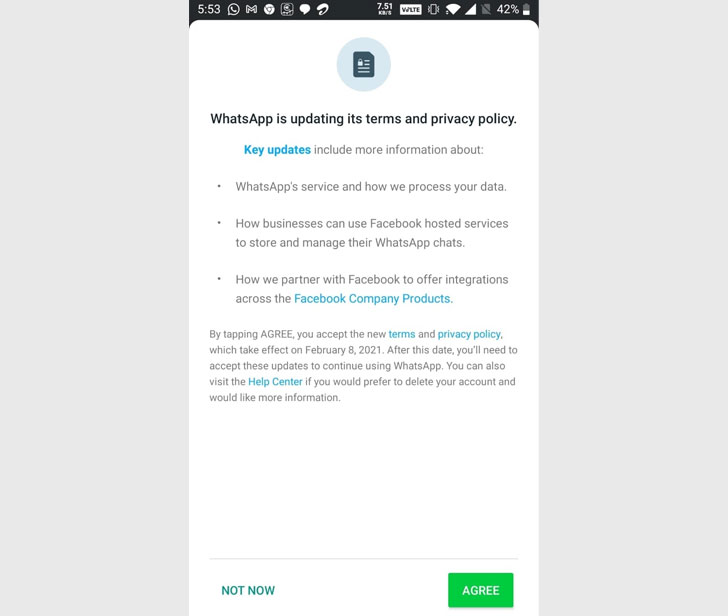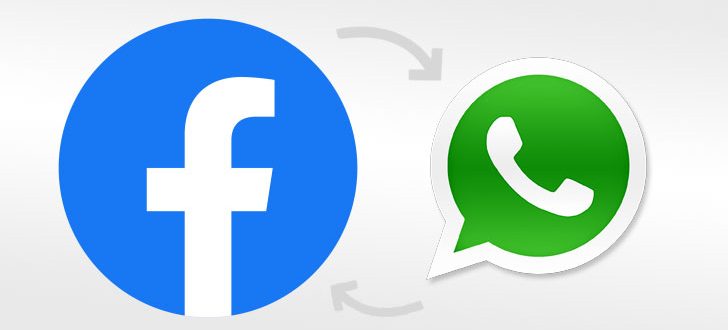“Respect for your privacy is coded into our DNA,” opens WhatsApp’s privacy policy. “Since we started WhatsApp, we’ve aspired to build our Services with a set of strong privacy principles in mind.”
But come February 8, 2021, this opening statement will no longer find a place in the policy.
The Facebook-owned messaging service is alerting users in India of an update to its terms of service and privacy policy that’s expected to go into effect next month.
The “key updates” concern how it processes user data, “how businesses can use Facebook hosted services to store and manage their WhatsApp chats,” and “how we partner with Facebook to offer integrations across the Facebook Company Products.”
The mandatory changes allow WhatsApp to share more user data with other Facebook companies, including account registration information, phone numbers, transaction data, service-related information, interactions on the platform, mobile device information, IP address, and other data collected based on users’ consent.
Unsurprisingly, this data sharing policy with Facebook and its other services doesn’t apply to EU states that are part of the European Economic Area (EEA), which are governed by the GDPR data protection regulations.
The updates to WhatsApp terms and privacy policy come on the heels of Facebook’s “privacy-focused vision” to integrate WhatsApp, Instagram, and Messenger together and provide a more coherent experience to users across its services.
Users failing to agree to the revised terms by the cut-off date will have their accounts rendered inaccessible, the company said in the notification.
WhatsApp’s Terms of Service was last updated on January 28, 2020, while its current Privacy Policy was enforced on July 20, 2020.
Facebook Company Products refers to the social media giant’s family of services, including its flagship Facebook app, Messenger, Instagram, Boomerang, Threads, Portal-branded devices, Oculus VR headsets (when using a Facebook account), Facebook Shops, Spark AR Studio, Audience Network, and NPE Team apps.
It, however, doesn’t include Workplace, Free Basics, Messenger Kids, and Oculus Products that are tied to Oculus accounts.
What’s Changed in its Privacy Policy?
In its updated policy, the company expands on the “Information You Provide” section with specifics about payment account and transaction information collected during purchases made via the app and has replaced the “Affiliated Companies” section with a new “How We Work With Other Facebook Companies” that goes into detail about how it uses and shares the information gathered from WhatsApp with other Facebook products or third-parties.

This encompasses promoting safety, security, and integrity, providing Portal and Facebook Pay integrations, and last but not least, “improving their services and your experiences using them, such as making suggestions for you (for example, of friends or group connections, or of interesting content), personalizing features and content, helping you complete purchases and transactions, and showing relevant offers and ads across the Facebook Company Products.”
One section that’s received a major rewrite is “Automatically Collected Information,” which covers “Usage and log Information,” “Device And Connection Information,” and “Location Information.”
Concerns About Metadata Collection
While WhatsApp is end-to-end encrypted, its privacy policy offers an insight into the scale and wealth of metadata that’s amassed in the name of improving and supporting the service. Even worse, all of this data is linked to a user’s identity.
Apple’s response to this unchecked metadata collection is privacy labels, now live for first- and third-party apps distributed via the App Store, that aim to help users better understand an app’s privacy practices and “learn about some of the data types an app may collect, and whether that data is linked to them or used to track them.”
The rollout forced WhatsApp to issue a statement last month. “We must collect some information to provide a reliable global communications service,” it said, adding “we minimize the categories of data that we collect” and “we take measures to restrict access to that information.”
In stark contrast, Signal collects no metadata, whereas Apple’s iMessage makes use of only email address (or phone number), search history, and a device ID to attribute a user uniquely.
There’s no denying that privacy policies and terms of service agreements are often long, boring, and mired in obtuse legalese as if deliberately designed with an intention to confuse users. But updates like this are the reason it’s essential to read them instead of blindly consenting without really knowing what you are signing up for. After all, it is your data.

